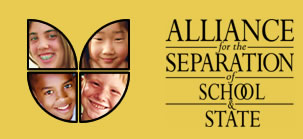 |
|
|
| ABOUT US | STORE | DONATIONS | FREE NEWSLETTER | BLOG | PRESS ROOM | CONTACT US |
|
|
Some thoughts on heroes (and their imperfections)
Originally published in The Education Liberator, Vol. 2, No. 10, December 1996/January 1997Among Separation supporters, there is a special group we refer to as "School Sakharovs." These are heroic individuals who have worked within the state school system, have witnessed its failures first hand, and who now speak out in favor of Separation.
Every few months, a fellow Separationist calls or writes with concern that we should not be exalting Andrei Sakharov because he was an atheist who signed the Humanist Manifesto II.
In the past, I've answered these questions privately, but as the issue recurs it is time to put something in writing.
We chose Sakharov not for his religion or his overall political views. We picked him because his insight, courage, and personal sacrifice sent shock waves through the thinking people of the Soviet Union and contributed to the fall of an "evil empire." A leading physicist and father of the Soviet hydrogen bomb program, he used his prestige to warn ever-widening circles of the dangers of the dysfunctional Soviet system.
Now, from our perspective in the Separation Alliance, we are asking people who have been successful in the tax-funded schooling system to stand up and proclaim for Separation. We honor those teachers, principals, administrators, college professors, aides, school board member, and vendors (to date, 61) who combine insight and courage. Many of them are making a sacrifice: Those who have retired or left the system may face shunning by former friends; those still within the system sometimes face harassment and even dismissal for making their position known.
But, like Sakharov, because of their position within the system, their words carry great weight. I like to consider John Taylor Gatto as our first Sakharov, and frequently say "One Gatto is a flare that lights up the sky; a thousand Gattos is a bombardment; a hundred thousand is victory!"
Why not use Gatto as our eponym? Why not refer to our courageous "School Gattos?" One reason is that John is still alive. He might yet mess up and embarrass us. Plus, such adulation, even for a person of John's decency and modesty, is a temptation to hubris. (Because I personally know the pride to which flesh is heir, I would for the same reason reject "School Fritz"--even if the term fit.)
What about people's concern that Andrei Sakharov lived and died an atheist? Well, the Separation Alliance is exactly that--an alliance of people of many worldviews and many pedagogies who hold one idea in common: government has no jurisdiction in education. If the Alliance had been founded 100 years ago at the height of Protestant domination of the tax-funded schools, doubtless the movement would have been heavily populated by Catholics, Unitarians, observant Jews, Seventh Day Adventists, atheists, agnostics, and others on the outs with mainstream Protestantism. If this organization had been founded this year in Bolivia, whose school system is dominated by Catholics, it would be filled mostly with Protestants.
Today's American tax-funded schools are officially neutral on religion, but that neutrality has had for several decades a distinctly relativist tendency, and in many districts, environmentalism has reached the level of de facto religion. Hence, one would expect the Separation Alliance to include a large number of people who disagree with relativism, specifically evangelical Protestants, conservative Roman Catholics, observant Jews and Muslims, and others, including atheists and agnostics who believe absolute truth exists and can be known. And that is indeed the case, and we welcome and seek the support and active membership of everyone who agrees that separating school and state is the best solution to our educational woes.
Using Andrei Sakharov as a hero is a subtle but unmistakable signal to all, atheist and theist, polytheist, pantheist, and agnostic, that we are an alliance that is open to all. Let me close by saying that your feedback is welcome. We can change our minds if we're wrong about choosing Sakharov as an eponym. After all, that is what we're asking the whole world to do about tax-funded schooling.
This article is copyrighted by the Alliance for the Separation of School & State. Permission is granted to freely distribute this article as long as this copyright notice is included in its entirety. The Education Liberator |
Some of the more
|
|
|
|
|||